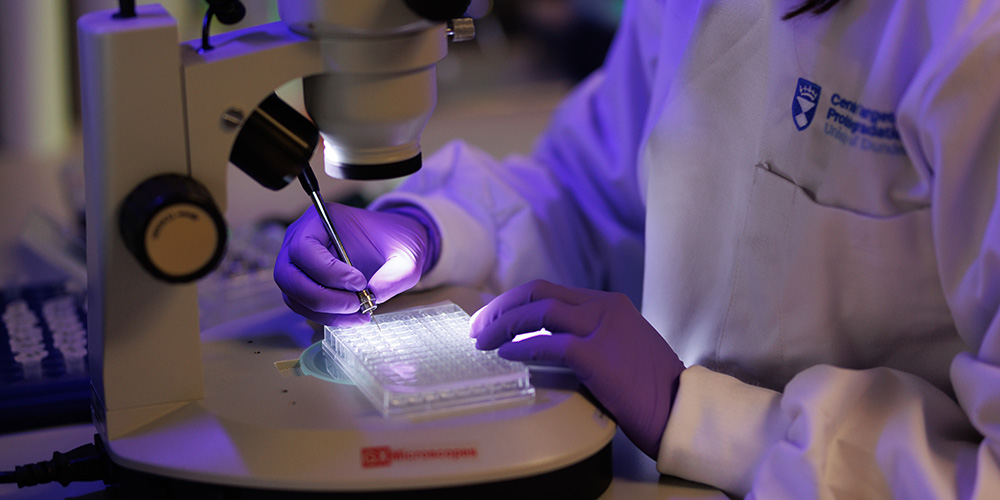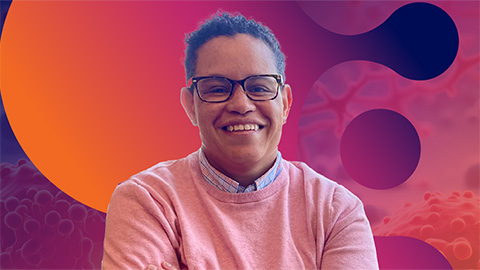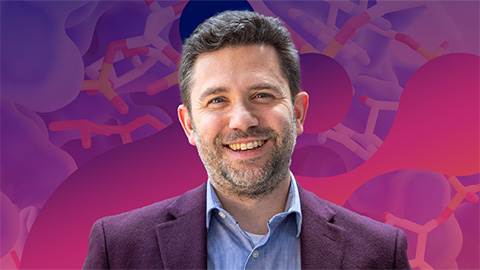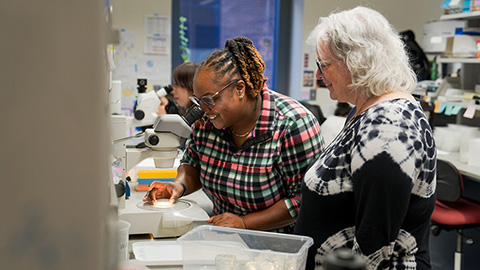'Protein sandwich' could transform cancer drug discovery
A breakthrough class of molecular glue identified at the University of Dundee could pave the way for a new generation of drugs to target cancers and neurodegenerative diseases.
A research team at the university’s Centre for Targeted Protein Degradation, led by Alessio Ciulli, in collaboration with the research group of Georg Winter at the Research Center for Molecular Medicine of the Austrian Academy of Sciences in Vienna, has defined a new class of so-called “intramolecular bivalent glue,” which binds proteins — crucial to the cells that allow our bodies to function correctly — that would otherwise stay apart.

This research has been published in the journal Nature.
“These findings have major implications for the entire pharmaceutical industry engaged in targeted protein degraders,” Ciulli said. “This is particularly true for the development of drugs that target cancer, neurodegenerative diseases and many more illnesses driven by proteins that have always been considered undruggable.
“Proteins are essential for our cells to function properly, but when these do not work correctly the body is vulnerable to disease.
“The glue that we have been able to define is special because it first attaches itself to one protein in two places — not just one — and then recruits the second protein, effectively sandwiching the two proteins together.
“We have only been able to identify this using our targeted protein degradation technology and have identified a vulnerability that can be exploited by the design of new drugs that could potentially transform treatment for cancer patients and those with other untreatable diseases.”
Targeted protein degradation, or TPD, is an emerging field of drug development for treating diseases that involves redirecting protein recycling systems in our cells to destroy disease-causing proteins. Most TPD strategies use small molecules — so-called degraders — to recruit these target proteins to a class of enzymes called ubiquitin E3 ligases. The E3 tags the target protein with ubiquitin labels, which ultimately leads to the destruction of the disease-causing protein via the cellular waste bin: the proteasome.
Working with collaborators at CEMM, the Goethe University of Frankfurt, and Eisai Co., Ltd, a Japanese pharmaceutical company, the Dundee team has been able to unveil a novel mechanism of molecular gluing, different from those previously known. This new mechanism binds to two sides of the target protein instead of just one, prompting a rearrangement of the whole protein and stabilising its previously unknown interaction with the E3 ligase.

Furthermore, the team was able to visualise, for the first time, the precise mechanism by which their compounds work and bring together the target proteins to one of these E3 ligases. Because the molecules have two heads, which latch on to two different regions within the same target protein, these have been coinedintramolecular bivalent glues.
This world-leading work has also illuminated previously underappreciated features and properties of molecular glues, paving the way for scientists to develop deeper understanding of glues that could allow for new classes to be discovered more rapidly.
“The impact of what we have revealed here cannot be underestimated,” Ciulli said. “This will cause a ripple effect throughout the pharmaceutical industry and has the potential to transform how we view drug development.
“Dundee is a world-leader in TPD, and our new home here at the Centre for Targeted Protein Degradation will only further enhance the reputation of the University in this revolutionary space.
“I must also pay tribute to our collaborators, whose input has been crucial in achieving this seismic breakthrough.”
Ciulli, from the university’s School of Life Sciences, is a leading figure in developing insights into TPD. Degrader molecules developed by Ciulli and his team are now utilized around the world in the quest to develop new treatments for illnesses such as cancer, as well as dermatological and neurological conditions. TPD research has attracted billions of pounds of investment globally in recent years, with Dundee widely recognised as a world leader in the field.
This article is republished from the University of Dundee website. Read the original here.
Enjoy reading ASBMB Today?
Become a member to receive the print edition four times a year and the digital edition monthly.
Learn moreGet the latest from ASBMB Today
Enter your email address, and we’ll send you a weekly email with recent articles, interviews and more.
Latest in Science
Science highlights or most popular articles

Life in four dimensions: When biology outpaces the brain
Nobel laureate Eric Betzig will discuss his research on information transfer in biology from proteins to organisms at the 2026 ASBMB Annual Meeting.

Fasting, fat and the molecular switches that keep us alive
Nutritional biochemist and JLR AE Sander Kersten has spent decades uncovering how the body adapts to fasting. His discoveries on lipid metabolism and gene regulation reveal how our ancient survival mechanisms may hold keys to modern metabolic health.

Redefining excellence to drive equity and innovation
Donita Brady will receive the ASBMB Ruth Kirschstein Award for Maximizing Access in Science at the ASBMB Annual Meeting, March 7–10, just outside of Washington, D.C.

Mining microbes for rare earth solutions
Joseph Cotruvo, Jr., will receive the ASBMB Mildred Cohn Young Investigator Award at the ASBMB Annual Meeting, March 7–10, just outside of Washington, D.C.

Fueling healthier aging, connecting metabolism stress and time
Biochemist Melanie McReynolds investigates how metabolism and stress shape the aging process. Her research on NAD+, a molecule central to cellular energy, reveals how maintaining its balance could promote healthier, longer lives.

Mapping proteins, one side chain at a time
Roland Dunbrack Jr. will receive the ASBMB DeLano Award for Computational Biosciences at the ASBMB Annual Meeting, March 7–10, just outside of Washington, D.C.

